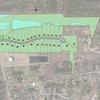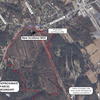Voorheesville and Albany County look to close deal with CSX over fees and liabilities in Quiet Zone
VOORHEESVILLE — The village of Voorheesville and Albany County appear closer than at any time in the past 13 years to ironing out the final few details with CSX for a safety-gate system at two crossings meant to keep trains silent as they roll through the village.
The potential deal will also save the village tens-of-thousands of dollars annually compared to what it would have been on the hook for had CSX stuck to an earlier fee proposal.
In late 2022, the freight carrier informed the village and county that maintenance of the two four-quadrant gate systems — at the company’s Main Street and Voorheesville Avenue crossings — would cost approximately $50,000 per year, and that Voorheesville and Albany County would be responsible for paying it.
“That came out of left field because there was no mention of maintenance” in the settlement agreement, Mayor Rich Straut stated during a November 2022 village board meeting. “I would have thought that would have been kind of laid out at that time.”
But the village and county continued to push back on CSX, which, after two years of insisting on $50,000 in annual upkeep, returned to the table in May with a $20,000-per-year proposal. On Thursday evening, Straut said the village and county would each be responsible for $10,200 in maintenance costs.
While a large number of taxpayer dollars will remain in village coffers, it’s likely that the village’s insistence on not assuming significantly more legal liability related to the Quiet Zone will pay off in the long run.
For some municipalities seeking to establish a Quiet Zone, a fraught financial endeavor can sometimes turn into a legal one, which, in turn, becomes an added financial burden.
That’s because, in seeking to establish a quiet zone, a city, county, town, or village can fundamentally alter their legal liabilities.
By silencing the train horn, a municipality allegedly assumes a greater share of the risk should an accident occur. And, while federal statute can pre-empt some lawsuits based solely on the failure of a conductor to sound his or her horn in a compliant Quiet Zone, government regulations can’t ever completely eliminate liability.
By shifting focus away from the person driving the train, questions can be asked about the adequacy of safety measures put in place by the local public authority, meaning a municipality can be sued if these measures are deemed insufficient, improperly designed, or malfunctioning, creating a new duty of care.
Reilly said on Thursday that, by “not requiring us to take on liability exposures other than sort of beyond the road [maintenance] that we actually maintain or the county maintains,” the village escapes having to become a “sort of the insurer if something goes wrong at that crossing.” But Reilly added the village could be responsible if, “for example, the signage that we maintain, if there was a defect in that.”


